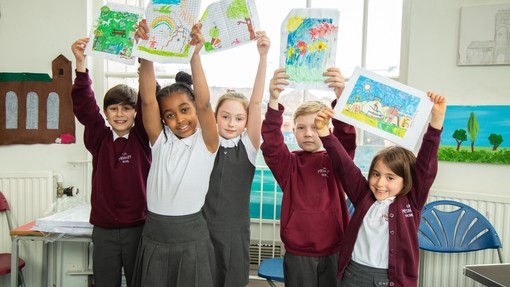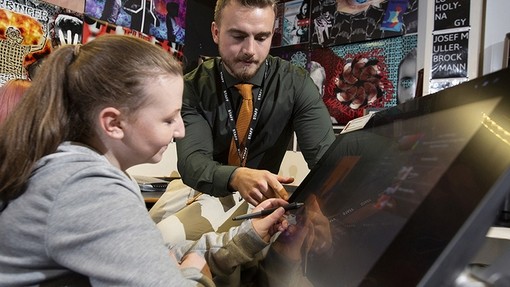
Why the arts are worth celebrating
Content
This Artsmark Celebration Week, Dame Reena Keeble tells us why arts and culture are essential parts of a child’s education
I was a primary headteacher for 22 years and thrilled that I was able to be a part of shaping children’s learning. What a joy it was!
There were so many magical moments that I remember in my time as headteacher. For instance, watching a Year 1 art lesson when many of the children were so absorbed in their work – almost lost in their thoughts – that when it came to playtime, they did not want to stop painting. Their teacher quite rightly decided to ignore playtime and allowed the children to stay and create, enjoy and celebrate their achievements.
On another occasion, I remember the sense of immense pride on the children’s faces after finishing their dance performance at our local authority dance festival. How delighted they were not to have forgotten their steps and to perform under the bright lights on a big stage in a rather grand hall full of parents. I can still see their smiling faces now.
I really believe it’s essential that we provide children in schools with not only a wide range of arts and cultural experiences but also opportunities to celebrate their achievements, finished products and, of course, their performances. Having fun is such an important part of school life and celebrating the arts is a part of the curriculum and school calendar for me.
In our school, we used the arts to help children to understand, appreciate and learn to respect cultural differences. We did this through art, dance, film, stories and drama. We found the arts provided a concrete platform to help our children understand what it means to be a global citizen.
The arts also did much to develop our children’s confidence and their resilience. They became less afraid of making mistakes, wanting to “have a go” and appreciated the importance of practice, practice and more practice – all important skills which could be transferred to other areas of learning in the curriculum.
Celebrating the arts with our parents and the local community within our authority did much to help raise the profile of our school. For example, parents and colleagues were thrilled to join us in celebrating the success of our Year 2 children who won a film-making competition. I could give so many more examples but the key point to note is, we believe the arts helped our children to develop the skills and characteristics to become lifelong learners and prepare them for the world of work.
As an assessor for Artsmark Award since it was refreshed and relaunched in 2015, I have found it a huge privilege to read of the amazing and impressive things schools are doing up and down the country to promote and celebrate the arts.
It’s so heartwarming to see how much Artsmark schools value the arts. The impact in many cases has been jaw-dropping and has given me goosebumps. I recall reading of how the children in one school set up their own radio station with some very remarkable outcomes. In another, I was struck by how the children had taken complete ownership of their school production, from the scriptwriting to the lighting, costumes, music, programming and filming.
Perhaps some of the most powerful case studies I’ve read have centred on how the arts have been used to educate young people about LGBT (lesbian, gay, bisexual and transgender) topics, cultural differences and provide access to the curriculum for pupils with SEND (special educational needs and disability).
There is much to celebrate when it comes to the arts. So I encourage you to share your work, thoughts, and experiences. We would love to hear what you have to say, so join us on Twitter this week using #CelebrateArtsmark.
Find out more about Artsmark Celebration Week here.
Dame Reena Keeble is the former headteacher of Cannon Lane Primary School in Pinner


